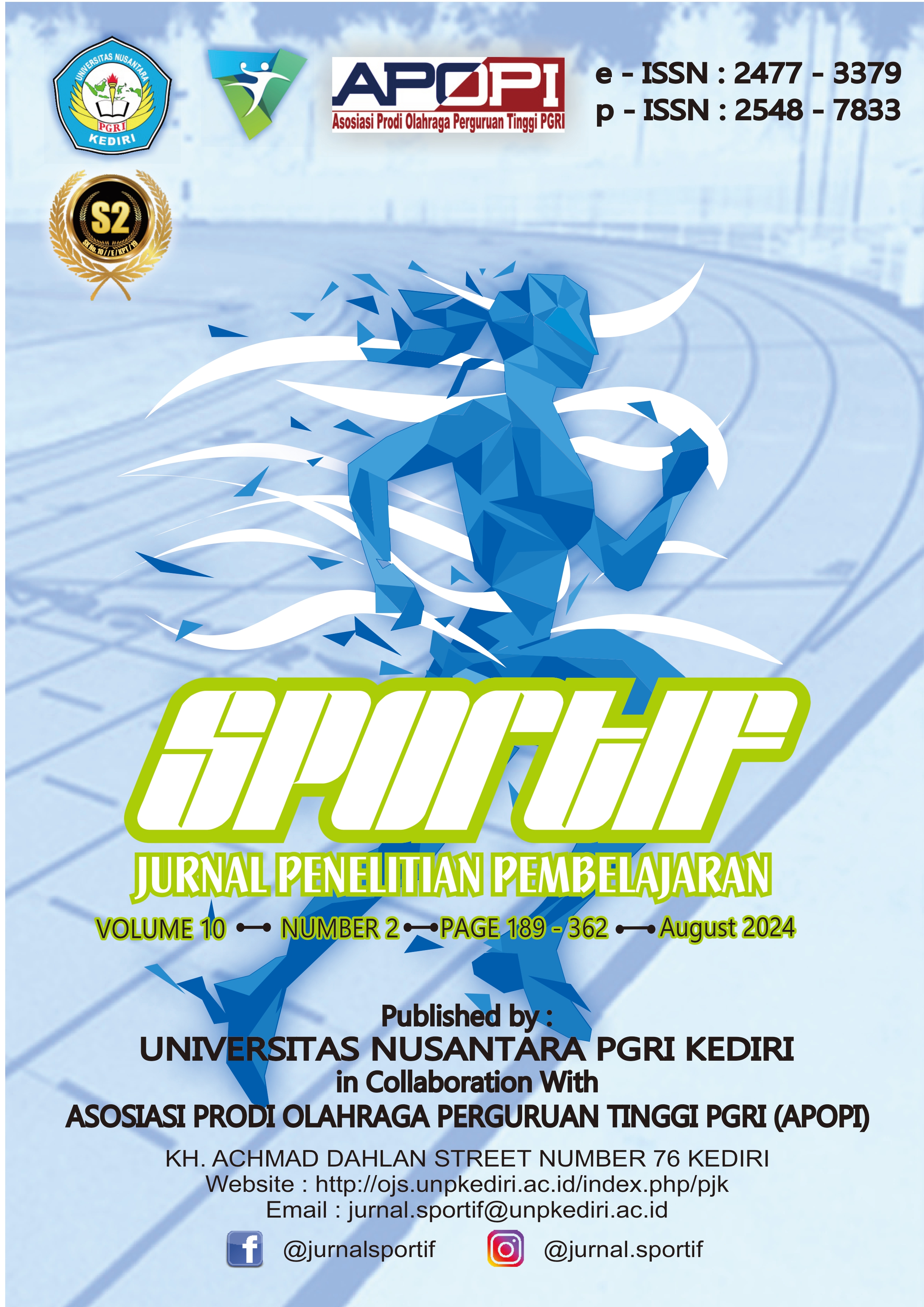Abstract
The coaching program with outstanding achievements has indeed been implemented based on the objectives of the coaching itself and the critical factors contained in a program. Factors from an organizational system that is not good can also affect achievement results. With appropriate stages and fulfilling these factors, it is hoped that achievement will be more easily achieved. Looking at the introduction above, it is clear that Indonesian floorball still has many obstacles in its sports management system. Still needs to be developed in all regions of Indonesia. Besides that, Indonesian floorball athletes' performance is considered less able to match Asian countries. Hence, this study aims to evaluate the sports organization system and the implementation of floorball athletes in the Indonesian Floorball Association. The objects of this research include the Chairperson of Floorball at the central and regional levels, the Secretary, the Treasurer, the Coach, and 96 athletes who competed in the big eight rounds of the national floorball championship in Jakarta. Data was collected using the mixed method by administering a CIPP questionnaire and giving physical test items to floorball athletes. The output of this research is an evaluation of the sports organization system in which policymakers can improve and create a good formula so that the future organization can be better so that floorball athletes' achievements can increase.
References
Anon. (2013). International Council for Coaching Excellence, International Sport Coacing Framework. USA: Human Kinetics,.
Biçer, M. (2021). The Effect of an Eight-Week Strength Training Program Supported with Functional Sports Equipment on Male Volleyball Players’ Anaerobic and Aerobic Power. Science and Sports 36(2):137.e1-137.e9. https://doi.org/10.1016/j.scispo.2020.02.006.
Boyle, Ian O. (2014). Developing a Performance Management Framework for a National Sport Organisation. Sport Management Review. https://doi.org/10.1016/j.smr.2014.06.006.
Chow, Jia Yi, Laurentius A. Meerhoff, Corliss Zhi Yi Choo, Chris Button, and Benjamin Su-Jim Tan. (2023). The Effect of Nonlinear Pedagogy on the Acquisition of Game Skills in a Territorial Game. Frontiers in Psychology 14. https://doi.org/10.3389/fpsyg.2023.1077065.
Creswell, J. W. (2012). Research Design Pendekatan Kualitatif, Kuantitaif Dan Mixed. Yogyakarta: Pustaka Belajar.
Desbrow, Ben. (2021). Youth Athlete Development and Nutrition. Sports Medicine 51(s1):3–12. https://doi.org/10.1007/s40279-021-01534-6.
Fasey, Kirsten J., Mustafa Sarkar, Christopher R. D. Wagstaff, and Julie Johnston. (2022). Psychology of Sport & Exercise Understanding Organizational Resilience in Elite Sport : An Exploration of Psychosocial Processes. Psychology of Sport & Exercise 62(June):102236. https://doi.org/10.1016/j.psychsport.2022.102236.
Laureys, Felien, Frederik J. A. Deconinck, Matthieu Lenoir, and Dave Collins. (2023). Teamwork Makes the Dream Work: Testing for Shared Perceptions on Psycho-Behavioural Skills between Athletes, Coaches and Parents. Psychology of Sport and Exercise 68:102473. https://doi.org/10.1016/j.psychsport.2023.102473.
Mathematics, Applied. (2016). Do Organizational Characteristics and Activities Influence Organizational Capacities? An Analysis for Indiana's Non-profit Sector. 1–23.
Misener, Katie, and Alison Doherty. (2019). A Case Study of Organizational Capacity in Non-profit Community Sport. Journal of Sport Management 23(4):457–82. https://doi.org/10.1123/jsm.23.4.457.
Mitchell, Jardine, Molly Tilbrook, Litza Kiropoulos, and Isabel Krug. (2024). Australian Elite Sport Coaches’ Mental Health Literacy of Eating Disorders, Orthorexia, and Muscle Dysmorphia in Athletes: A Qualitative Study. Body Image 48:101670. https://doi.org/10.1016/j.bodyim.2023.101670.
Pate, Joshua R., Robin Hardin, Deborah Shapiro, and Cathy McKay. (2023). Inclusion, Infusion, or Confusion: Exploring How Faculty Address Adaptive Sport and Recreation in the Sport Management Classroom. Journal of Hospitality, Leisure, Sport & Tourism Education 33:100458. https://doi.org/10.1016/j.jhlste.2023.100458.
Petronell, Moisescu, and Moisescu Florentina. (2013). Sports Organization Management : Between Constraints and Objectives. 81:95–99. https://doi.org/10.1016/j.sbspro.2013.06.394.
Riazi, A. Mehdi, and Christopher N. Candlin. (2014). Teaching : Mixed-Methods Research in Language Teaching and State-of-the-Art Article Mixed-Methods Research in Language Teaching and Learning : 135–73. https://doi.org/10.1017/S0261444813000505.
S. Y. Sudikan. (2015). Pendekatan Interdisipliner, Interdisipliner, Multidisipliner, Dan Transdisipliner Dalam Studi Sastra,. doi: doi: https://doi.org/10.26740/parama.v2n1.p%25p.
Sunu, I. Gusti Ketut Arya. (2021). Multicultural Education Management. Proceedings of the 5th Asian Education Symposium 2020 (AES 2020) 566(Aes 2020):111–14. https://doi.org/10.2991/assehr.k.210715.023.
Tervo, Taru, and Anna Nordstrom. (2014). Science of Floorball: A Systematic Review. Open Access Journal of Sports Medicine (January):249. https://doi.org/10.2147/oajsm.s60490.
Tinoco, Aline, Jekaterina Schneider, Sharon Haywood, and Emily L. Matheson. (2023). ‘They Are Men, They Will Be Looking Even If You Put on Pants or a Sweatshirt’: Girl Athletes’ and Coaches’ Experiences of Body Image in Mexico City Sport Settings. Body Image 46:73–83. https://doi.org/10.1016/j.bodyim.2023.05.002.
Van den Berg, Liandi, Ben Coetzee, and Martie Mearns. (2020). Establishing Competitive Intelligence Process Elements in Sport Performance Analysis and Coaching: A Comparative Systematic Literature Review. International Journal of Information Management 52:102071. https://doi.org/10.1016/j.ijinfomgt.2020.102071.
Vidal-Vilaplana, Alberto, Cristian Gregori-Faus, David Parra-Camacho, and María H. González-Serrano. (2023). Analysis of Sport Management Subjects in University Sports Sciences Degrees in Spain. The International Journal of Management Education 21(2):100771. https://doi.org/10.1016/j.ijme.2023.100771.
Wahyudin. (2020). Implementasi Sport Development Index ( SDI ) Di Makassar Berdasarkan Model Evaluasi CIPP. 481(Icest 2019):168–73.
Authors who publish with this journal agree to the following terms:
- Copyright on any article is retained by the author(s).
- The author grants the journal, the right of first publication with the work simultaneously licensed under a Creative Commons Attribution License that allows others to share the work with an acknowledgment of the work’s authorship and initial publication in this journal.
- Authors are able to enter into separate, additional contractual arrangements for the non-exclusive distribution of the journal’s published version of the work (e.g., post it to an institutional repository or publish it in a book), with an acknowledgment of its initial publication in this journal.
- Authors are permitted and encouraged to post their work online (e.g., in institutional repositories or on their website) prior to and during the submission process, as it can lead to productive exchanges, as well as earlier and greater citation of published work.
- The article and any associated published material is distributed under the Creative Commons Attribution-ShareAlike 4.0 International License






